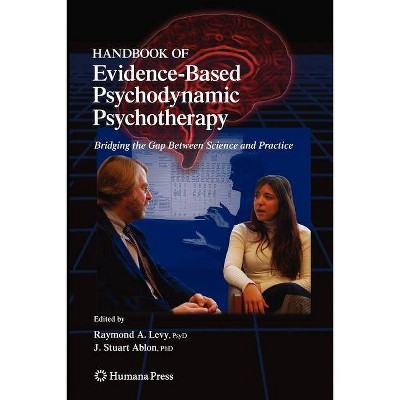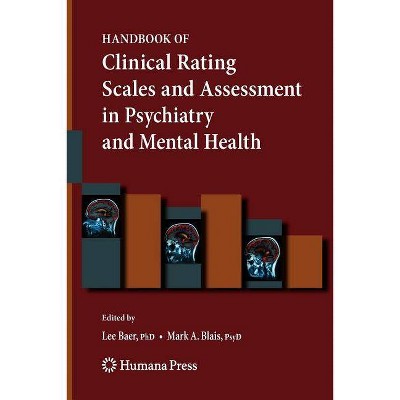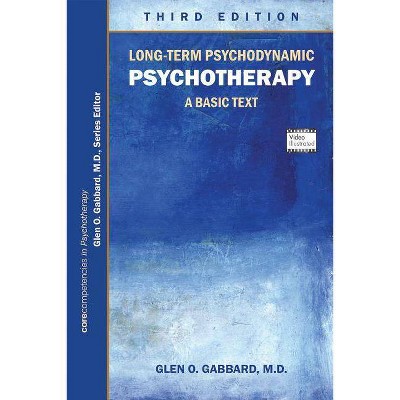Handbook of Evidence-Based Psychodynamic Psychotherapy - (Current Clinical Psychiatry) by Raymond A Levy & J Stuart Ablon (Paperback)

Similar Products
Products of same category from the store
AllProduct info
<p/><br></br><p><b> About the Book </b></p></br></br><p>This important book provides compelling evidence that psychodynamic psychotherapy is an effective treatment for many common psychological problems. Bringing together distinguished clinician-researchers, the book bridges the gap between science and practice.</p><p/><br></br><p><b> Book Synopsis </b></p></br></br>Part I Evidence-Based Psychodynamic Psychotherapy: Bridging the Gap between Science and Practice Foreword Glen Gabbard, MD Introduction Raymond A. Levy, PsyD J. Stuart Ablon, PhD Part II Efficacy and Effectiveness Studies for Specific Disorders 1. The Efficacy of Psychodynamic Psychotherapy for Specific Disorders: A Review Falk Leichsenring, PhD 2. Manualized Psychodynamic Psychotherapy for Panic Disorder Fred Busch, MD Barbara Milrod, MD 3. Naturalistic Psychotherapy for Panic Disorder Tai Katzenstein, PhD J. Stuart Ablon, PhD Raymond Levy, PsyD 4. Psychotherapy for Eating Disorders: A Review of Empirically-Supported Treatments Heather Thompson-Brenner, PhD Drew Westen, PhD 5. Empirical Evidence for Transference Focused Psychotherapy and Other Psychodynamic Psychotherapy for Borderline Personality Disorder Ken Levy, PhD Rachel Wasserman, MS Lori N. Scot, MS Frank Yeomans, MD, PhD Part III Empirical Measures of Psychotherapy Process 6. Studying Change in Defensive Functioning in Psychotherapy, Using the Defense Mechanism Rating Scales: Four Hypotheses, Four Cases J. Christopher Perry, MPH, MD Stephen M. Beck, PhD Prometheas Constantinides, MD J. Elizabeth Foley, PhD 7. Process Measures for Psychodynamic Psychotherapy Caleb J. Siefert, PhD Jared A. Defife, PhD Matthew R. Baity, PhD 8. Countertransference and Personality Pathology: The Development and Clinical Application of the Countertransference Questionnaire Ephi Betan, PhD Drew Westen, PhD Part IV Theory, Technique and Process in Psychodynamic Psychotherapy 9. Alliance, Negotiation and Rupture Resolution Jeremy Safran, PhD Christopher Muran, PhD 10. Affect-Focused Techniques in Psychodynamic Psychotherapy Marc Diener, PhD Mark Hilsenroth, PhD 11. Affect-Focused Short-term Dynamic Psychotherapy: Empirically-Supported Strategies for Resolving Affect Phobias Leigh McCullough, PhD Molly Magill, PhD 12. Psychotherapy for Depression: Attaining and Sustaining Good Outcomes Sid Blatt, PhD David Zuroff, PhD Lance Hawley, PhD Part V The Neurobiology of Psychodynamic Theory and Psychotherapy 13. Neural Models of Psychodynamic Concepts and Treatments: Implications for Psychodynamic Psychotherapy Andrew Gerber, MD Josh Roffman, MD 14. Physiologic Monitoring in Psychodynamic Psychotherapy Carl Marci, MD Helen Riess, MD Part VI Letters on Research in Psychodynamic Psychotherapy 15. A Letter to my Friend and Researcher Colleague, Sy Entistle Rolf Sandell, MD 16. The Perils of P-values: Why Tests of Statistical Significance Impede Progress in Research John Kelley, PhD 17. From Psychoanalyst to Psychoanalyst/Researcher: A Personal Journey Ira Lable, MD 18. Clinicians' Love/Hate Relationship with Clinical Research Anne Alonso, PhD 19. Measuring and Enhancing the Impact of Psychodynamic Psychotherapy Research: An Open Letter to Scientists and Clinicians Anthony Weiss, MD, MSc<p/><br></br><p><b> From the Back Cover </b></p></br></br><p>The importance of conducting empirical research for the future of psychodynamics is presented in this excellent new volume. In <em>Handbook of Evidence Based Psychodynamic Psychotherapy: Bridging the Gap Between Science and Practice</em>, the editors provide evidence that supports this type of research for two primary reasons. The first reason concerns the current marginalization of psychodynamic work within the mental health field. Sound empirical research has the potential to affirm the important role that psychodynamic theory and treatment have in modern psychiatry and psychology. The second reason that research is crucial to the future of psychodynamic work concerns the role that systematic empirical investigations can have in developing and refining effective approaches to a variety of clinical problems. Empirical research functions as a check on subjectivity and theoretical alliances in on-going attempts to determine the approaches most helpful in working with patients clinically. <em>Handbook of Evidence Based Psychodynamic Psychotherapy: Bridging the Gap Between Science and Practice</em> brings together a panel of distinguished clinician-researchers who have been publishing their findings for decades. This important new book provides compelling evidence that psychodynamic psychotherapy is an effective treatment for many common psychological problems.</p><p/><br></br><p><b> Review Quotes </b></p></br></br><br><p>From the reviews: </p> <p>"This book evaluates the current state of research in psychodynamic psychotherapy and how evidence-based techniques can be applied to psychodynamic practice. ... The book is written for practitioners of psychodynamic psychotherapy, clinical researchers, and interested laypersons. ... This is an excellent addition to the psychodynamic field ... ." (Brett C. Plyler, Doody's Review Service, February, 2009)</p><p>"This book comprises a rich set of previously unpublished papers written by a Who's Who of clinician-researchers including Glen Gabbard, Drew Westen, Leigh McCullough, Jeremy Safran and many others. They present a vibrant body of research that demonstrates that psychodynamic therapy is an effective treatment for a range of common problems. ... This book makes a powerful plea to professional organizations to foster the development of research, a call that all psychodynamic institutes would do well to heed." (Paul Efthim, New England Psychologist, December, 2009)</p><p>"Handbook of Evidence-Based Psychodynamic Psychotherapy: Bridging the Gap Between Science and Practice offers a coherent and user-friendly introduction to the field. ... Each chapter is self-contained ... . Chapters are written for clinicians: research methodology and statistical analyses are explained clearly, and chapters are relatively short, easy to read and emphasize research questions of interest to clinicians ... . thought-provoking, and it will make pleasurable reading for any psychoanalytic clinician interested in learning about current developments in psychotherapy research." (Eve Caligor, The International Journal of Psychoanalysis, Vol. 91, 2010)</p><br>
Price History
Price Archive shows prices from various stores, lets you see history and find the cheapest. There is no actual sale on the website. For all support, inquiry and suggestion messagescommunication@pricearchive.us




















